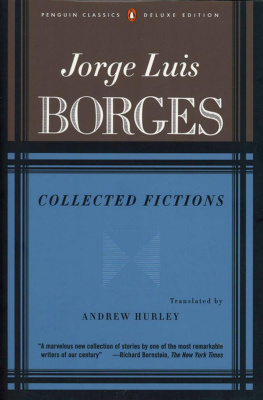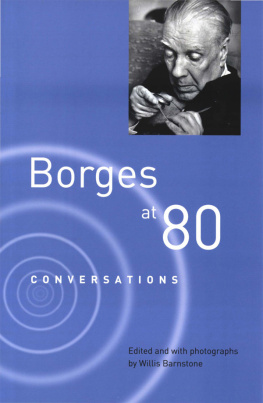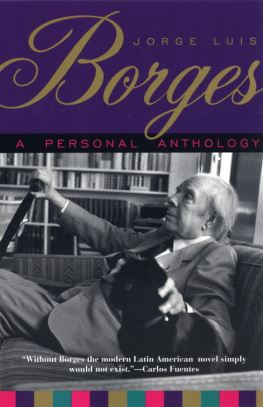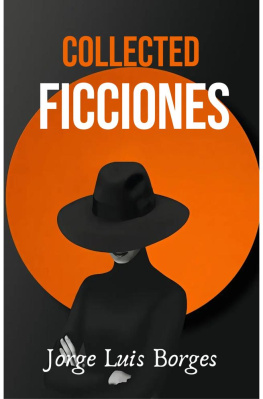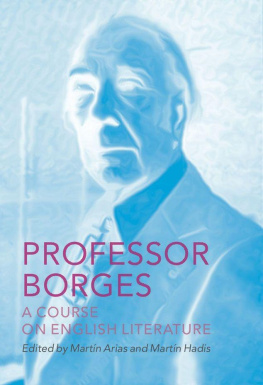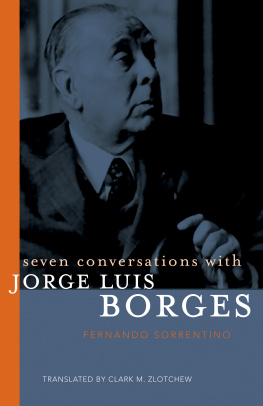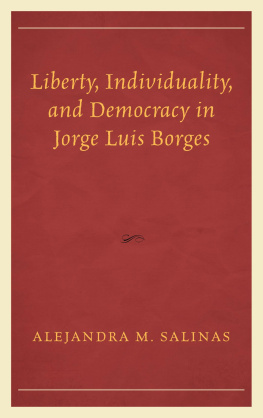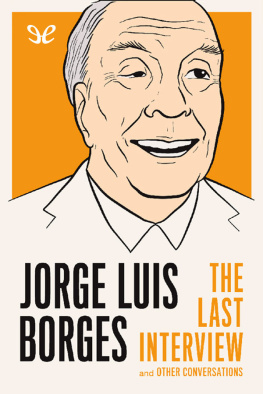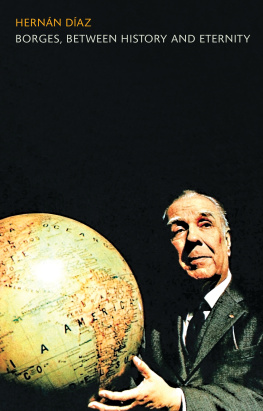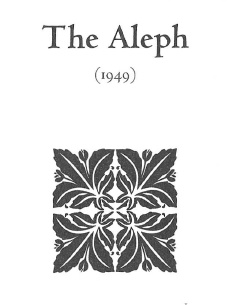PENGUIN BOOKS
COLLECTED FICTIONS
Jorge Luis Borges was born in Buenos Aires in 1899 and was educated in Europe. One of the most widely acclaimed writers of our time, he published many collections of poems, essays, and short stories before his death in Geneva in June 1986. In 1961 Borges shared the International Publishers prize with Samuel Beckett. The Ingram Merrill Foundation granted him its Annual Literary Award in 1966 for his outstanding contribution to literature. In 1971 Columbia University awarded him the first of many degrees of Doctor of Letters, honoris causa (eventually the list included both Oxford and Cambridge), that he was to receive from the English-speaking world. In 1971 he also received the fifth biennial Jerusalem Prize and in 1973 was given one of Mexico's most prestigious cultural awards, the Alfonso Reyes Prize. In 1980 he shared with Gerardo Diego the Cervantes Prize, the Spanish worlds highest literary accolade. Borges was Director of the Argentine National Library from 1955 until 1973.
Andrew Hurley is Professor of English at the University of Puerto Rico in San Juan, where he also teaches in the Translation Program. He has translated over two dozen book-length works of history, poetry, and fiction, including novels by Reinaldo Arenas. Ernesto Sabato, Fernando Arrabal, Gustavo Sainz, and Edgardo Rodriguez Julia and stories by Ana Lydia Vega, and many shorter works.
Acknowledgments
I am indebted to the University of Puerto Rico at Ro Piedras for a sabbatical leave that enabled me to begin this project. My thanks to the administration, and to the College of Humanities and the Department of English, for their constant support of my work not only on this project but throughout my twenty-odd years at UPR.
The University of Texas at Austin, Department of Spanish and Portuguese, and its director, Madeline Sutherland-Maier, were most gracious in welcoming the stranger among them. The department sponsored me as a Visiting Scholar with access to all the libraries at UT during my three years in Austin, where most of this translation was produced. My sincerest gratitude is also owed those libraries and their staffs, especially the Perry-Castaeda, the Benson Latin American Collection, and the Humanities Research Center (HRC). Most of the staff, I must abashedly confess, were nameless to me, but one person, Cathy Henderson, has been especially important, as the manuscripts for this project have been incorporated into the Translator Archives in the HRC.
For many reasons this project has been more than usually complex. At Viking Penguin, my editors, Kathryn Court and Michael Millman, have been steadfast, stalwart, and (probably more often than they would have liked) inspired in seeing it through. One could not possibly have had more supportive colleagues, or co-conspirators, who stuck by one with any greater solidarity.
Many, many people have given me advice, answered questions, and offered support of all kindsthey know who they are, and will forgive me, I know, for not mentioning them all personally; I have been asked to keep these acknowledgments brief. But two people, Carter Wheelock and Margaret Sayers Peden, have contributed in an especially important and intimate way, and my gratitude to them cannot go unexpressed here. Carter Wheelock read word by word through an "early-final" draft of the translation, comparing it against the Spanish for omissions, misperceptions and mistranslations, and errors of fact. This translation is the cleaner and more honest for his efforts. Margaret Sayers Peden (a.k.a. Fetch), one of the finest translators from Spanish working in the world today, was engaged by the publisher to be an outside editor for this volume. Fetch read through the late stages of the translation, comparing it with the Spanish, suggesting changes that ranged from punctuation to "readings."
Translators want to translate, love to translate; for a translator at the height of her powers to read a translation in this painstaking way and yet, while suggesting changes and improvements, to respect the other translator's work, his approach, his thought processes and creativityeven to applaud the other translator's (very) occasional strokes of brillianceis to engage in an act of selflessness that is almost superhuman. She made the usual somewhat tedious editing process a joy.
I would never invoke Carter Wheelock's and Fetch Peden's readings of the manuscripts of this translationor those of Michael Millman and the other readers at Viking Penguinas giving it any authority or credentials or infallibility beyond its fair deserts, but I must say that those readings have given me a security in this translation that I almost surely would not have felt so strongly without them. I am deeply and humbly indebted.
First, last, always, and in number of words inversely proportional to my gratitudeI thank my wife, Isabel Garayta.
Andrew Hurley
San Juan, Puerto Rico, June 1998
The Immortal
Solomon saith: There is no new thing upon the earth. So that as Plato had an imagination, that all knowledge was but remembrance; so Solomon giveth his sentence, that all novelty is but oblivion. Francis Bacon: Essays, LVIII
In London, in early June of the year 1929, the rare book dealer Joseph Cartaphilus, of Smyrna, offered the princess de Lucinge the six quarto minor volumes (1715-1720) of Pope's Iliad. The princess purchased them; when she took possession of them, she exchanged a few words with the dealer. He was, she says, an emaciated, grimy man with gray eyes and gray beard and singularly vague features. He expressed himself with untutored and uncorrected fluency in several languages; within scant minutes he shifted from French to English and from English to an enigmatic cross between the Spanish of Salonika and the Portuguese of Macao. In October, the princess heard from a passenger on the Zeus that Cartaphilus had died at sea while returning to Smyrna, and that he had been buried on the island of Ios.
In the last volume of the Iliad she found this manuscript.
It is written in an English that teems with Latinisms; this is a verbatim transcription of the document.
I
As I recall, my travails began in a garden in hundred-gated Thebes, in the time of the emperor Diocletian. I had fought (with no glory) in the recent Egyptian wars and was tribune of a legion quartered in Berenice, on the banks of the Red Sea; there, fever and magic consumed many men who magnanimously coveted the steel blade. The Mauritanians were defeated;the lands once occupied by the rebel cities were dedicated in ternitatem to the Plutonian gods; Alexandria, subdued, in vain sought Caesar's mercy; within the year the legions were to report their triumph, but I myself barely glimpsed the face of Mars. That privation grieved me, and was perhaps why I threw myself into the quest, through vagrant and terrible deserts, for the secret City of the Immortals.
My travails, I have said, began in a garden in Thebes. All that night I did not sleep, for there was a combat in my heart. I rose at last a little before dawn. My slaves were sleeping; the moon was the color of the infinite sand. A bloody rider was approaching from the east, weak with exhaustion. A few steps from me, he dismounted and in a faint, insatiable voice asked me, in Latin, the name of the river whose waters laved the city's walls. I told him it was the Egypt, fed by the rains. "It is another river that Iseek," he replied morosely, "the secret river that purifies men of death." Dark blood was welling from his breast. He told me that the country of his birth was a mountain that lay beyond the Ganges; it was rumored on that mountain, he told me, that if one traveled westward, to the end of the world, one would come to the river whose waters give immortality. He added that on the far shore of that river lay the City of the Immortals, a city rich in bulwarks and amphitheaters and temples. He died before dawn, but I resolved to go in quest of that city and its river. When interrogated by the torturer, some of the Mauritanian prisoners confirmed the traveler's tale: One of them recalled the Elysian plain, far at the ends of the earth, where men's lives are everlasting; another, the peaks from which the Pactolus flows, upon which men live for a hundred years. In Rome, I spoke with philosophers who felt that to draw out the span of a man's life was to draw out the agony of his dying and multiply the number of his deaths. I am not certain whether I ever believed in the City of the Immortals; I think the task of finding it was enough for me. Flavius, the Getulian proconsul, entrusted two hundred soldiers to me for the venture; I also recruited a number of mercenaries who claimed they knew the roads, and who were the first to desert.

